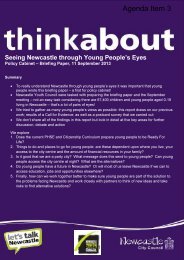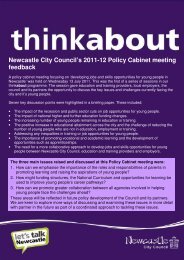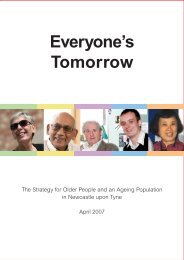NEWCASTLE'S MUSICAL HERITAGE AN INTRODUCTION By ...
NEWCASTLE'S MUSICAL HERITAGE AN INTRODUCTION By ...
NEWCASTLE'S MUSICAL HERITAGE AN INTRODUCTION By ...
You also want an ePaper? Increase the reach of your titles
YUMPU automatically turns print PDFs into web optimized ePapers that Google loves.
CHAPTER TEN<br />
MUSIC FOR EVERYONE<br />
It is said that by the second half of the 19 th century Britain was awash with<br />
music and certainly in Newcastle there were a growing number of societies<br />
devoted to the promotion of good music and an audience who wanted to hear it.<br />
Looking back it does seem to have been a sort of Golden Age in the town’s<br />
musical history. Having discovered this I find it difficult to understand a remark<br />
made in a local history book of the 1950s, commenting on Newcastle’s growth<br />
and achievements, that ‘Music, like art, won little public support during the pre-<br />
1914 period’. It is not surprising that with this kind of remark in local history books<br />
Newcastle is still generally regarded as a town without any musical history to<br />
speak of. It is true that the Victorian upper classes adopted an essentially<br />
Philistine attitude towards music, which extended to the Church, colleges and<br />
schools and there can be no doubt that this attitude worked against the town<br />
establishing a sound musical culture in the 19 th and early 20 th centuries. Music as<br />
a profession was rated low on the social scale – it was more ‘Downstairs’ than<br />
‘Upstairs’ so to speak, but having said that many Victorians were deeply musical<br />
and there were the heroic few who in the face of such ignorance, devoted time<br />
and effort towards establishing a form of higher musical culture within the town<br />
and they received a good deal of public support. Choral singing was a<br />
tremendously popular activity with all classes of society, which is not surprising<br />
given the English preference for song and bearing in mind that in Victorian times,<br />
big was beautiful, especially when it came to Handel choruses. However, public<br />
performance was not always the raison d’etre for starting up these choral<br />
societies. They were usually started by eager amateurs who under the guidance<br />
of one or more professionals sought to bring together like minded people<br />
interested in making music for the pleasure it gave them. The public concert was<br />
simply the icing on the cake for those that had worked hard during the course of<br />
the year. There were other organisations more devoted to the practise and<br />
performance of instrumental music to a high standard and whilst I understand<br />
there was considerable rivalry between these two factions I found no evidence of<br />
this in Newcastle’s case.<br />
The most famous of the choral societies at the end of the 19 th century was<br />
probably the Newcastle and Gateshead Choral Union, which was formed in<br />
1896. It had originally been the Gateshead Choral Union, founded in 1889.<br />
Mainly for reasons of accommodation they amalgamated with the Newcastle<br />
Choral Union (founded by William Rea in 1860) and became a formidable body,<br />
claiming at one point to have 400 voices. It began to attract leading singers and<br />
English composers, who conducted the choir in performances of the big choral<br />
works, such as Gounod’s ‘Messe Solonnelle’, Spohr’s ‘Last Judgement’,<br />
Schumann’s ‘Advent Hymn’ and Cowen’s ‘St. John’s Eve’. They had at their<br />
62

















